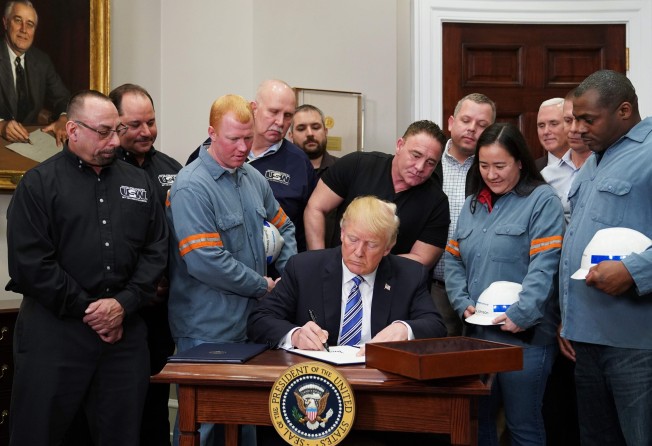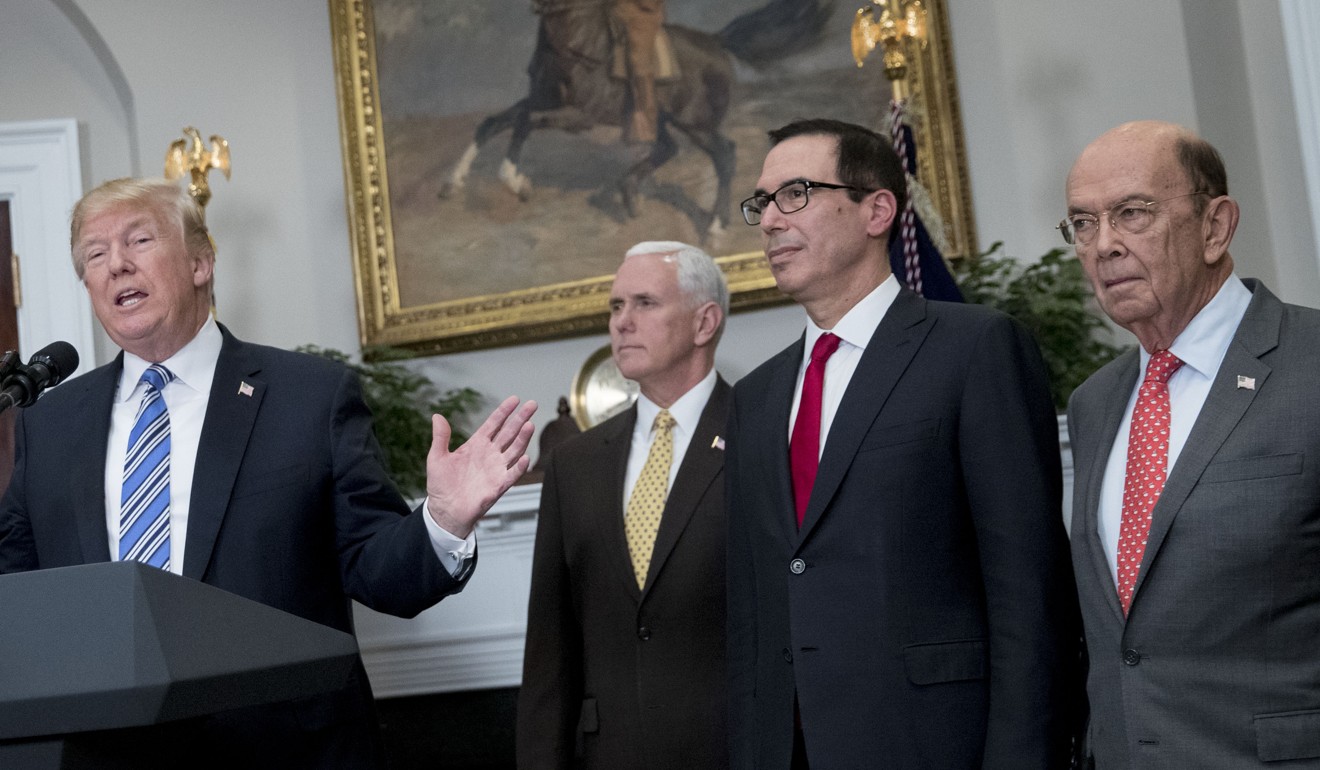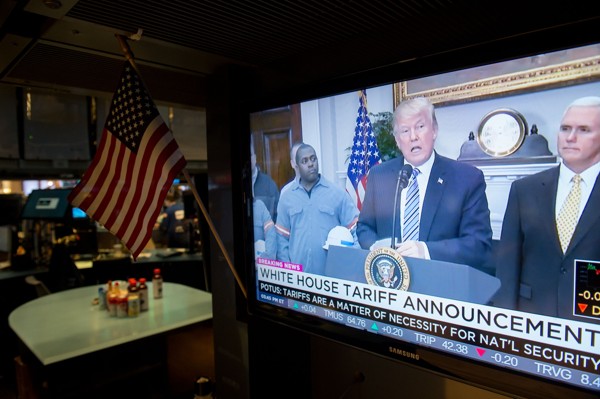Trump’s tariffs plan: his most crass and counterproductive malaprop yet
There’s no evidence of a trade war – especially one waged in the rear-view mirror – ever having been ‘good’, and even less of any ‘being easy to win’

It must surely go down as one of the most breathtakingly crass comments ever made by someone in serious high office: “Trade wars are good, and easy to win.”
I sense as the history books get written, Donald Trump will be remembered for many epic malaprops, but this will surely be among the hardest to live down.
The president announced he is pressing ahead with the imposition of 25 per cent tariffs on steel imports and 10 per cent for aluminium on Thursday, but exempted Canada and Mexico, backtracking from earlier pledges of tariffs on all countries.
Let’s be clear Mr Trump: there is no evidence of a trade war ever having been good, and even less of any trade war being easy to win.
Most have inflicted deep harm on all protagonists. Most have cost consumers dear. Many have ended not in trade war, but real war. It is surely not the way to make America great again.
As the World Trade Organisation’s Roberto Azevedo commented in the wake of Trump’s astonishing tweet: “An eye for an eye will leave us all blind, and the world in a deep recession.”
The White House decision to throw tariffs at steel and aluminium imports is crass and counterproductive on many fronts. I’m sure Gary Cohn, before resigning in despair at the beginning of the week as Trump’s top economic adviser, must have been clear and eloquent on the delinquent disastrousness of such a course. All the more alarming that he was ignored.
Commerce Secretary Wilbur Ross, from Trump’s side in the White House bunker, for some strange reason thought he could restore some calm to alarmed markets worldwide when he claimed: “We are not trying to blow up the world.” But the trouble is, Mr Ross, this seems to many exactly what you and colleagues Robert Lighthizer and Peter Navarro are willing to do. You are certainly playing with fire.
Let’s look at just four of the reasons why the decision is so crass:
First, while some have drawn comfort from the fact that steel and aluminium tariffs in their own right account for only a tiny proportion of trade, we must be absolutely certain that is only the opening shot from the White House bunker, and it is really not a very original idea.
Since Lighthizer has spent much of his adult life fighting for protection for the US’s endemically uncompetitive steel industry, it might seem an obvious place to start. But the steel industry has been protected by high tariffs for so many years already, it is hard to see what sustainable gains are possible.

At the end of 2017, 60 per cent of US steel imports were already covered by special protections of one kind or another, and 94 per cent of China’s steel exports were subject to restrictions.
Second, we are led to believe that Trump’s primary trade target is China. In which case this week’s measures are ludicrously astray of their target. According to the Peterson Institute’s Chad Bown, the new measures will on an annual basis eliminate US$14.2 billion worth of steel imports, but less than 5 per cent of these (US$689 million) will be from China. Over half (US$7.5 billion) would have been from Europe, Canada, Japan and South Korea.
Which takes us to the third idiocy: the measures explode spectacularly underneath the US’s principal security allies worldwide. If at any future point, the US hopes to win support from these allies in addressing the many quite legitimate concerns the world has about access to China’s markets, and the way it competes, this is a very weird way of going about it.
And fourth, as so far articulated, this is a trade war being waged in the rear-view mirror.
Pointing the barrels at the very allies the US will need alongside it to wage these behind-the-border battles inside China, seems counterproductive at the very least
If you talk to US or European companies in Beijing about their concerns over competing in or with China, they are focused not on manufactured products, but on the multiple barriers frustrating access to opportunities in the significant China market.
These are to do with licencing and regulations and a myriad behind-the-border barriers that tip the scales in favour of local companies.
It is possible that the White House trade team may in due course get round to tackling issues like intellectual property abuse, but in the meanwhile point the barrels at the very allies the US will need alongside it to wage these behind-the-border battles inside China, seems counterproductive at the very least.
There are of course a couple of cynical political reasons why the US has turned its guns on steel exporters such as Canada in particular.
First, one of next week’s first midterm election contests is in Pennsylvania, where hundreds of thousands of steel workers have seen catastrophic decline over the past four decades. Trump travels there this weekend to fend off a Democratic challenge.
What better rallying-call to old steel towns like Pittsburg than a campaign to make American steel great again?
Second, take a sideways look at US frustrations with Canada over slow progress in redrafting the North American Free Trade Agreement (Nafta), and note another little Trump tweet this week: “Tariffs on steel and aluminium will only come off (Canada) if new and fair Nafta agreement is signed.”
The blackmail could not be more blatant, and it will be interesting to see Canada’s willpower in facing it down.

Whether the Trump trade team has opened a pandora’s box that will suck us all into a mutually-destructive trade war, the unhappy reality is that if their main aim has been to curb the ascent of China, then their strategy has already badly misfired.
Not only is China’s domestic economy now large and strong enough to sustain reasonable growth even if trade growth is curtailed, but the profound eccentricity and unpredictability of the US’s international economic policies is actually aiding China’s ascent, both in Asia and among long-time strategic US allies like Canada, Japan and Germany.
China may remain a frustrating and challenging market in which to work, but we make a profound error when we ignore that it has been economically liberalising – and consistently so – for the past 30 years.
Yes, it is less open than the US. It is liberalising from a very low base, and is liberalising more slowly than we would like.
But working with allies to encourage further and faster liberalisation surely makes better sense than declaring trade war – which for sure that will neither be good, nor easy to win.
David Dodwell researches and writes about global, regional and Hong Kong challenges from a Hong Kong point of view